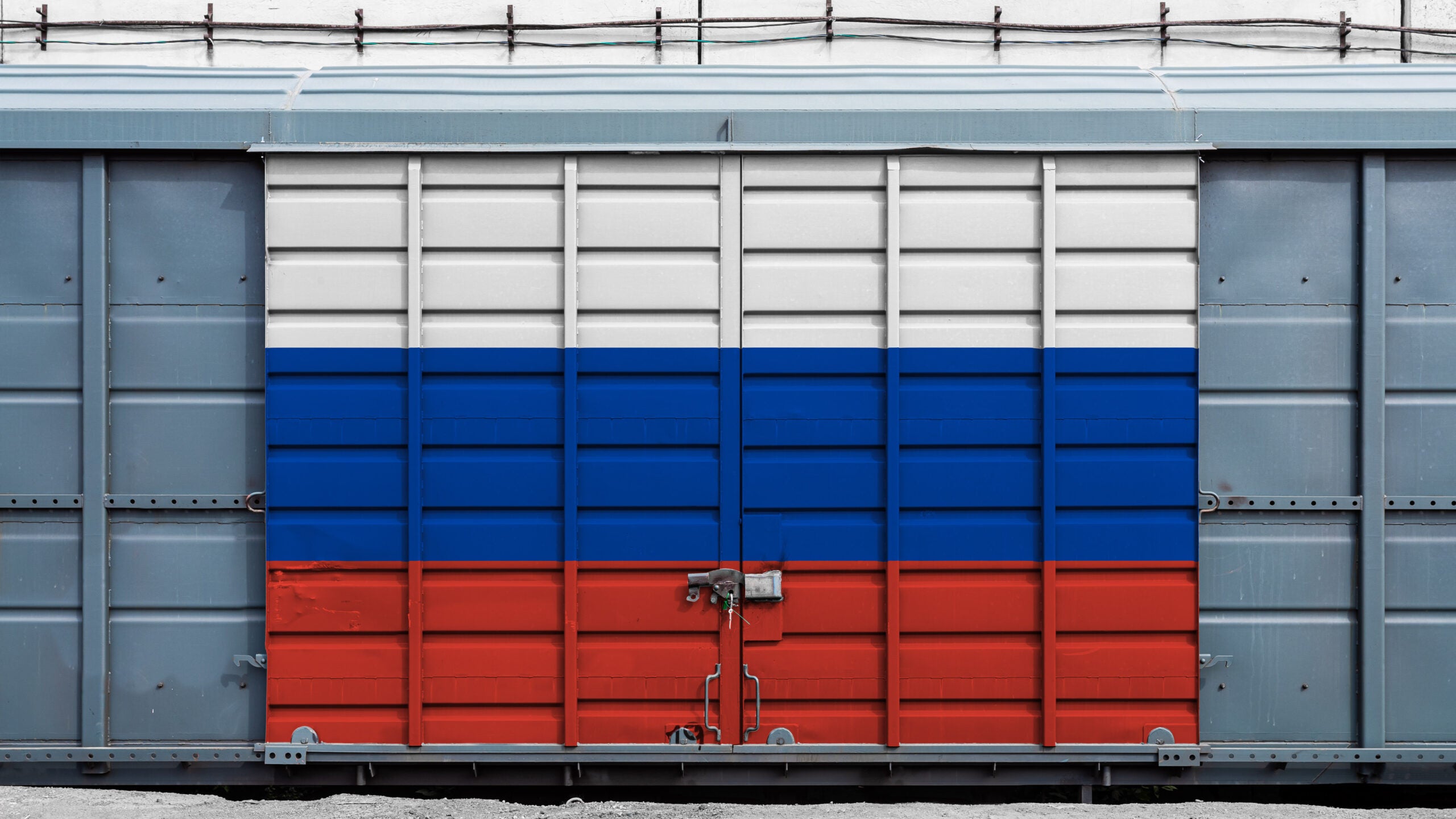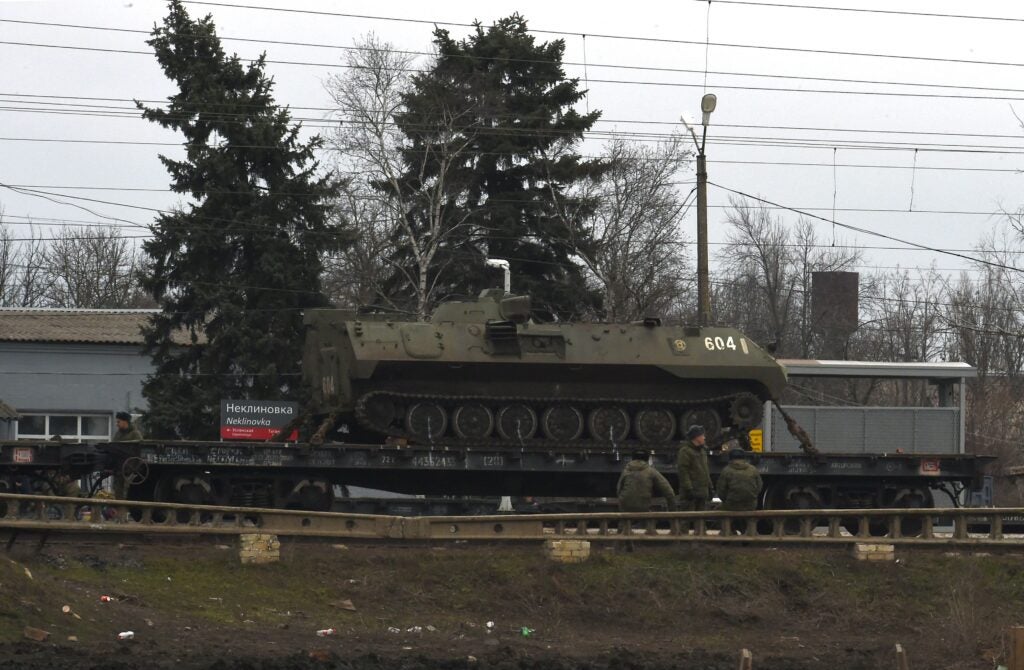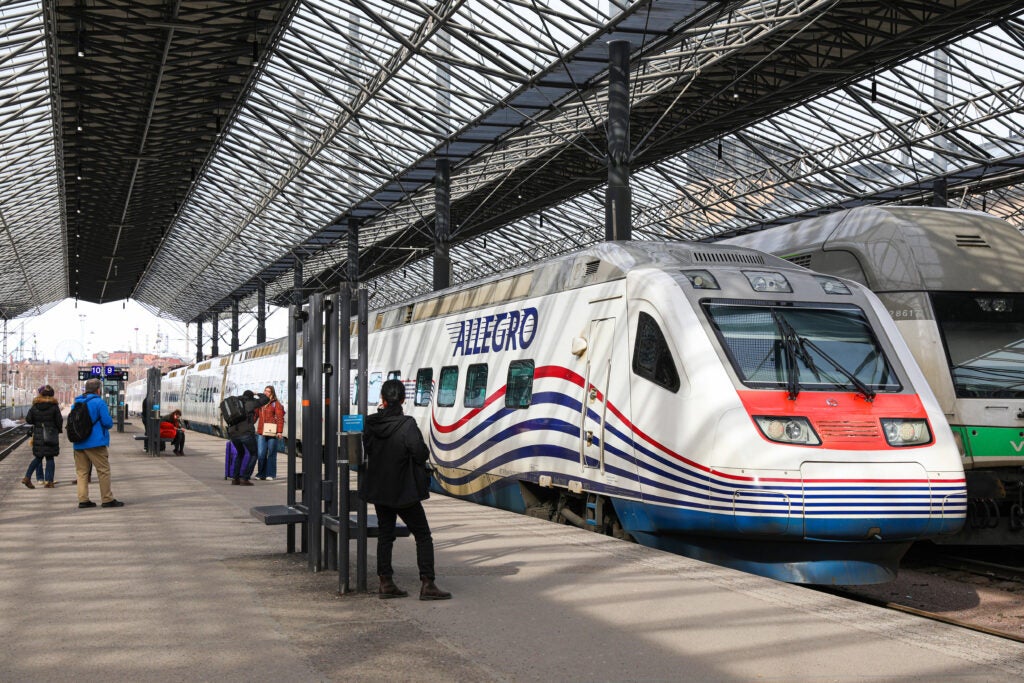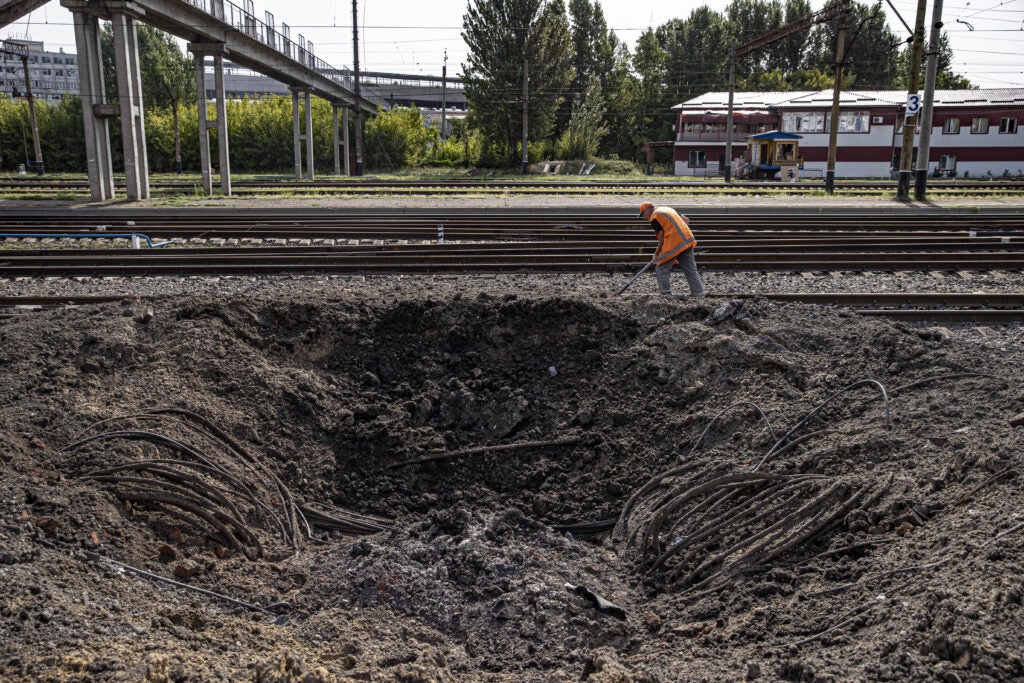
Six months to the day that Russia launched its invasion of Ukraine – and the 31st anniversary of Ukraine’s independence from the former Soviet Union – a Russian rocket hit the country’s Chaplyne railway station, resulting in the deaths of 25 people with tens of others injured.
The attack wasn’t in isolation; in fact, Russia has made a concerted effort to target Ukraine’s rail network, believing it would dilute defence efforts and restrict Ukraine’s ability to deploy military hardware.

Discover B2B Marketing That Performs
Combine business intelligence and editorial excellence to reach engaged professionals across 36 leading media platforms.
Russia has targeted Ukraine’s rail infrastructure with heavy weapons, whilst in response to the war, the West has hit Russia with a barrage of sanctions that, industry experts warn, is already leading Russia’s rail industry into crisis – potentially the worst in modern times.
Mid-February
As the military build-up on Ukraine’s borders appears almost complete, concerns grow among Western allies that conflict is near. Speaking at a security conference in Munich, Germany, US Vice President Kamala Harris warns: “We have prepared, together, economic measures that will be swift, severe and united.”
In the days that followed, President Putin declares regions of east Ukraine as people’s republics, adding that orders had been given for troops to move into separatist areas. In response, the EU, US, and the UK impose new sanctions, including on imports and exports, which would ultimately lead to rail operations being dragged into the crisis.
Russia must have known that sanctions would be the chosen weapon of the West; the country was already the target of them following its annexation of Crimea in 2014. In the days before Russia made its move last winter, those sanctions were being enhanced. Financial markets were targeted, imports banned, and assets of some of Russia’s so-called oligarchs were frozen.

US Tariffs are shifting - will you react or anticipate?
Don’t let policy changes catch you off guard. Stay proactive with real-time data and expert analysis.
By GlobalData24 February
Preluded by months of military build-up, at around 6am Moscow time President Vladimir Putin told Russia, and the world, that his forces had embarked upon a “military operation” in the east of Ukraine in a bid to demilitarise and “de-Nazify”, in an act of self-defence.
There was an almost immediate international response, largely of condemnation. US President Joe Biden branded the act “premeditated” and one that would result in “catastrophic loss of life and human suffering”. European Commission President Ursula von der Leyen said the bloc would impose a “massive and targeted” package of measures, and UK Prime Minister Boris Johnson said that the “hideous and barbaric venture must end in failure”.
Later that evening, von der Leyen outlined the EU’s sanctions. Those relating to transport were largely targeted at the country’s aviation sector. However, import and export controls would have an impact on Russian rail freight. They meant that rail services, whilst permitted to travel through Russia, were not able to call at any stations there.
Other sanctions, not specifically aimed at railways, still threatened the rail industry. Financial transactions and the exchange of goods and services would be impacted. If these weren’t damaging enough, freight in terms of exports from Russia would dry up, as numerous international stakeholders withdrew their support. This would result in freight services travelling through Russia declining, as exporters and carriers opted for other modes.

27 February
Russian state-owned rail operator, Russian Railways (RZD), is sanctioned by the EU. The bloc had announced just days before that the operator would fall under the “Second Package” of measures, under which restrictions were placed on financial and investment activities.
Early March
The economic impact of Russia’s actions is beginning to be felt on the railways, as exporters look to pull away from the country. Many cite ethical issues for their decision to stop using Russian rail routes.
24 March
The UK adds RDZ to its list of sanctions. “Today’s sanctions target key industries supporting Russia’s illegal invasion, including Russian Railways and defence company Kronshtadt,” the British Government said.
28 March
VR Group, the Finnish national rail operator, suspends the Allegro rail service – which carries passengers between Helsinki and St Peterburg – until further notice. It also said that it was discontinuing freight wagon traffic, calling for all wagons to return from Russia.
“Thus far, we have been continuing the Allegro train services according to the instructions by the relevant authorities and, hence, making sure that we can provide a safe passage to the Finnish citizens,” said Topi Simola, the rail provider’s passenger services senior vice-president. “During these weeks, people who have wanted to depart from Russia have had adequate time to leave. Now, due to the sanctions, we will discontinue the service.”
The decision to suspend freight services was overturned just days later after the Finish state-owned operator said it had consulted with the UK. It had been applying what it thought UK sanctions against Russia required, which included a requirement not to work with RDZ.
In a statement, the company said: “Since last week’s decision [to halt freight] we have continued discussions with the UK authorities and banks about the imposition of sanctions on our company. According to the British authorities and banks’ clarification, the sanctions do not apply to our operations.”

11 April
RDZ defaults on a bond interest payment, the first enterprise to do so since sanctions were brought against Russia. Although RDZ was reported to have tried to make the payment, holders did not receive it due to “legal and regulatory compliance obligations within the correspondent banking network”, according to authorities.
18 June
Lithuania bans the movement of EU-sanctioned goods between the Russian mainland and the exclave of Kaliningrad in the west. The Baltic Sea province is home to almost half a million Russians; in order to travel or transport goods between the two, people or freight must largely cross the EU Member State’s territory by rail.
Belarus, sandwiched between the two, was already being sanctioned following the controversial election of President Alexander Lukashenko in August 2021. This meant the movement of certain freight between Russia and Kaliningrad had already been curtailed.
The ban, which would be implemented by Lithuanian authorities and state-owned rail operator LTG, would cover sanctioned goods only – including coal, construction materials, metals, and advanced technologies. LTG said passenger travel and non-sanctioned goods would remain unaffected and continue as usual.
21 June
In response to what it branded a blockade of Kaliningrad, Russia fired a warning shot at the Lithuanian Government. It said it would take “appropriate measures” in the “near future”, adding they would have consequences for the people of Lithuania that would have a “serious negative influence on the population”.
Lithuanian Prime Minister Ingrida Šimonytė said there was “no blockade of Kaliningrad”, whilst a spokesperson for the European Commission, Eric Mamer, supported the ban, saying: “Lithuania is basically doing what it is supposed to do under the sanctions regime.”
5 July
A total of €82m worth of assets of several Russian and Belarusian individuals and legal entities, which include transportation companies, are seized by Finnish authorities. Reuters reports in the region of 865 rail cars from Russia had been confiscated by the Finnish bailiff authority by that point.

10 July
A raft of new items are added to the banned list for transportation across Lithuania to Kaliningrad – with alcohol and cement among them. The second round of restrictions was part of the fifth package of measures agreed by the EU.
In response to claims by Moscow that such measures were in breach of international agreements, Brussels and Vilnius began a period of consolation to determine the veracity of Russia’s complaint amid concerns that the EU guidance lacked clarity and could lead to an escalation of tensions in the region.
13 July
EU guidance confirms road transit of sanctioned goods with Russian operators is not allowed under the EU measures, but that no such prohibition exists for rail transport, without prejudice to Member States’ obligation to perform effective controls.
19 July
RZD calls on the EU to lift the measures. In a statement, the company said: “Sanctions aim at limiting the ability of RDZ to perform socially significant, humanitarian functions and are discriminatory in relation to the population of the Russian Federation. In addition, they contradict a significant number of norms of international law and acts of the EU itself.”
22 July
News breaks, first among Russian outlets, that the ban on the transit of sanctioned goods across Lithuania has been lifted. Attributing comments to LTG’s Mantas Dubauskas, the RIA news agency said customers had been told goods could once again be moved. The news was followed by a report from Russian state-owned Tass news agency, suggesting a Kaliningrad government official had said 60 wagons of cement would soon be shipped into the exclave, the first shipment of any kind in weeks.
Late August
The imposition of sanctions preventing Russia from transporting goods via rail through Lithuania continues to command attention. Calling for guidance to be reviewed every six months, Lithuanian lawmaker and chairman of the Lithuanian parliament’s Committee for the Future, Raimundas Lopata, said the decision to allow freight travel in July had been a political, not legal one. He said it was reversed in part due to pressure from Russia and an unwillingness among some EU Member States not to stoke tensions.
The news comes around the same time the country’s Transport Minister Marius Skuodis acknowledged there had been challenges in inspecting Russian cargo travelling through Lithuania because of the numbers of transporters involved.
Sanctions are having a major impact on Russia’s ability to ship freight and move people across borders. However, indirectly they are hitting rail infrastructure too, with industry insiders suggesting manufacturing and maintenance are bearing the brunt, largely thanks to restrictions on the import of materials and technologies.





